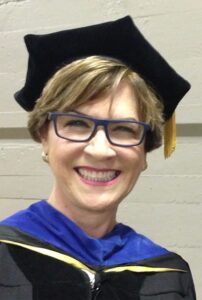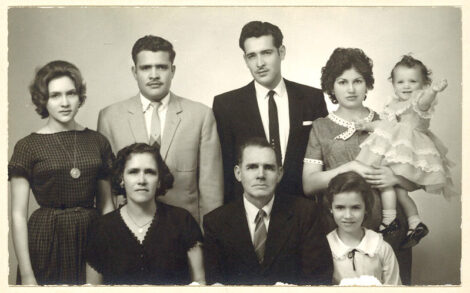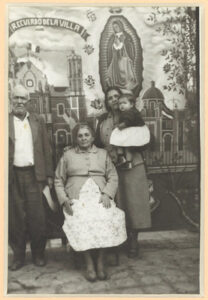• By Celina Moreno, J.D. • IDRA Newsletter • August 2025 • 
Dr. María “Cuca” Robledo Montecel was a true inspiration: researcher, advocate, expert and professional. She served as President & CEO of IDRA for 26 years, dedicating most of her extraordinary career to the organization, where she led the way and provided data-driven advocacy and expertise to improve education for all children. She lived every day as a model of faith, courage, insight and persistence.
Faith: Family and Community
From her earliest years, Cuca courageously crossed borders. The same was true of her family. Her parents, Ismael Robledo Martínez and Paula Benavides Robledo, crossed the Rio Grande River and settled close enough to Mexico to visit Cuca’s abuelita Albinita on the Mexican side every Sunday. 
She was the youngest of four children and said that her mother felt as though she raised two families because of the age gap between the older and younger pairs: a set of boys and a set of girls. Cuca formed a particularly close bond with her older sister, Rosa Guadalupe “Lupe” Robledo, who also served as a role model for courage, as she was born with serious heart problems. The two remained close for Lupe’s entire life. Following Lupe’s passing, Cuca would follow her sister’s model by becoming both an aunt and maternal figure to her sister’s children in turn.
Cuca was inspired and shaped by her family. Though her mother, Paula, could be stern, she met the challenges of raising a family and keeping up with relatives on both sides of the border. Cuca could talk to her mother about anything. They lived in a poor barrio of El Chacon in Laredo, Texas, and Paula was always able to give her children what they needed.
Cuca’s father, Ismael, was an extraordinary man who was a diligent provider. He inspired her sense of fairness and love of learning. She felt that she never lacked anything with her family, especially love and faith.
Cuca found that attending Catholic school and witnessing the conviction of her parents and peers helped solidify her faith at a young age. Her parents also imparted the value of deeply caring for the welfare of children because they always prioritized the care of both their immediate and extended family.
She learned how to be a mother to her two sons, Ismael Gavino Montecel and Xavier Mario Montecel, Ph.D., with her partner, Lucas Montecel. The boys grew with the care, faith and love that Cuca learned from her family and community, and they found their own ways. Ismael is a data scientist who served in the U.S. Air Force, and her younger son, Xavier, is director of the graduate program and assistant professor of Catholic, theological and social ethics at St. Mary’s University. Cuca was an immensely “proud mama” of who her sons are and what they have accomplished.
Cuca’s life was defined by faith, and her optimism showed in every aspect of her life and work. She was a Catholic lector and Eucharistic Minister at St. Matthew’s Church. She was also an independent sensei Zen teacher in the White Plum lineage. Roshi Robert Kennedy, S.J., conferred her inka (final seal of approval) in 2020, making Cuca a roshi (Zen master).
In a particularly significant feat, Cuca completed the Camino de Santiago in Spain, not once, but twice. In sacred silence, she walked many miles with Xavier and with her Zen community.
Courage: Overcoming Obstacles, Valuing All Students
Cuca fully lived her family’s values of courage, making her own way from an early age. She helped pay for her high school education at Ursuline Academy, the choice for girls from many of Laredo’s most prestigious families, by working in the school’s office. She graduated as valedictorian in 1970.
When she was 17, Cuca left her home in Laredo for Our Lady of the Lake University (OLLU) in San Antonio. She chose it after finding other universities in the city at the time to be cold and uninviting. In her estimation, OLLU resonated with her and had a little of her borderland culture.

Young María “Cuca” Robledo Montecel with her family: [l-r, top row] Rosa Guadalupe Robledo (sister), Anselmo Robledo (brother), Alfredo Robledo (brother), Enedina Robledo (Alfredo’s wife), Rosalinda Robledo (Alfredo’s daughter); [l-r, bottom row] Paula Benavides Robledo (mother), Ismael Robledo Martínez (father), and María del Refugio Robledo.
She graduated with a bachelor of science in social work in 1972. Cuca went on to get her master’s degree in educational evaluation from the Juarez-Lincoln Center in Austin part of Antioch College’s university without walls program, where she would hear conversations about how democratic societies need institutions to act as catalysts for change and innovation.
Cuca’s doctorate was in research and evaluation from the urban education program at the University of Wisconsin at Milwaukee, with her dissertation, “Utilization of Research in Education: Theories in Use Among University Faculty and Local Education Agency Personnel.”
This doctoral study on the relationship between education research and application in systems was the starting point for her work on systems change at IDRA. For example, during a time when outside forces pressed for quick fixes, Cuca developed the IDRA Quality Schools Action Framework, emphasizing the interconnectedness of schools, their communities and effective policy and funding.
Insight: Providing a Vision for the Path Forward
An early formative experience for Cuca occurred during her time at OLLU in the early 1970s, when she took English from Sister Laura Ann Quiñones, who was the first person to give Cuca a C during midterms and was notoriously difficult to please. The drive to succeed and learn led Cuca to end her first course earning a B-plus, and she learned so much that she took three of her four English courses at OLLU with Sister Quiñones. The two became lifelong friends after Cuca’s graduation and worked together as both continued their careers in education.
Upon graduation from OLLU, Cuca did brief stints as a researcher and evaluator with behavioral research laboratories and development associates out of Washington, D.C. This experience helped her learn about the application of research and evaluation in schools.
She was only 23 years old when she began working at IDRA. Her introduction to the organization came about unexpectedly. In 1976, Cuca was working with Dr. Ernesto Bernal at the University of Texas at San Antonio (UTSA) in the bilingual evaluation program. But the program was suddenly closed. Conscious that Cuca and other young professionals would be without a job, Dr. Bernal called Blandina “Bambi” Cárdenas, Ph.D., and IDRA founder and director José A. Cárdenas, Ed.D. (no relation). After interviewing with both Drs. Cárdenas, Cuca was hired as a research assistant.
From there, Cuca worked on a variety of projects and began to learn and collaborate with the professionals and educators at IDRA. She had the opportunity to direct training and

Don Telesforo Robledo Gutierrez and Doña Cuquita Robledo Martínez (María “Cuca” Robledo Montecel’s paternal grandparents), Sra. Paula Benavides Robledo and little Cuca Robledo in her mama’s arms at the Basilica of Guadalupe in Mexico City, circa 1953.
technical assistance, to conduct the first studies of the costs of bilingual education in Utah and Colorado, and to establish the Center for the Prevention and Recovery of Dropouts.
At IDRA, Abelardo Villarreal, Ph.D., taught her about how to effect change in schools. She learned from Aurelio Montemayor, M.Ed., about the power that families and communities have to help strengthen schools. Dr. José Cárdenas was her great mentor, teaching her about leadership and showing care and concern even as Cuca grappled through finding time to be both a professional and a mother.
Cuca became director of IDRA in 1992 when Dr. Cárdenas retired. Under her tenure, the organization flourished while still reflecting Dr. Cárdenas’ foundational vision, principles and passion.
In her 26 years leading IDRA, Cuca increased the organization’s funds many times over and oversaw the establishment of important IDRA programs and areas of expertise.
IDRA was founded by stakeholders and educators concerned about funding for public schools in Texas. Cuca continued this work as head of IDRA to prioritize the study and evaluation of school funding, such as by shepherding the José A. Cárdenas School Finance Fellows Program established in 2013 in honor of Dr. Cárdenas.
Cuca was a pioneer in school dropout research. In 1986, she was the principal investigator and project director of the Texas School Dropout Survey Project, the state’s first statewide study of dropouts.
Cuca and her colleagues demonstrated true persistence and ingenuity in the whirlwind six months they conducted the study, which used a new attrition methodology to calculate more accurate dropout rates. IDRA annually publishes its Texas public school attrition study, leveraging these data to help policymakers and school stakeholders work toward schools and communities being better prepared to understand and tackle the issue of attrition.
“By the time we got to the early 1980s, there was increasing concern,” she said in a 2018 interview. “At the forefront of confronting the issues that were getting in the way of equal educational opportunity, IDRA decided to focus on dropouts and what was being done, or not done, about that.”
IDRA’s research on the dropout issue, combined with staff experiences with cross-age tutoring, informed the development of the IDRA Valued Youth Partnership (VYP). VYP encapsulated her vision of valuing and guiding youth to see the value in themselves and succeed.
Under Cuca’s guidance, the program expanded, thriving into an international model dropout prevention and youth leadership program. More than 98% of tutors stay in school, and they have higher attendance, lower discipline rates, improved academics and higher self-esteem. Since its inception in 1984, the program has kept 35,700 students in school – young people who were previously considered at risk of dropping out. To date, the program has positively impacted the lives of more than 740,000 children, families and educators. Just this past April, IDRA celebrated the program’s 40th anniversary and presented the second Dr. María “Cuca” Robledo Montecel Gadfly Award to Dr. Mike Flores, Chancellor of Alamo Colleges District.
“We must stop defining students by their obstacles andstart defining them by their promise.
– Dr. María “Cuca” Robledo Montecel
Cuca insisted that schools don’t just rest with graduating students; they must prepare them for college, and universities must support underserved students. For example, she led IDRA’s role as managing partner in building the ENgaging LAtino Communities for Education (ENLACE) initiative to strengthen Latino college pathways and inspired countless young leaders.
Cuca oversaw IDRA’s expansion of community outreach research and advocacy alongside Aurelio and created IDRA’s Education CAFE model – an innovation for school-family-community collaboration based in community organizations that work with schools to increase student success in their communities.
She provided testimony, research and advocacy against the expansion of school vouchers that take vital money away from already underfunded public schools. For example, in 1998, she served as a panelist for a community forum on school vouchers when the Children’s Educational Opportunity (CEO) foundation set up a 10-year, $50 million initiative to provide vouchers to students in the Edgewood ISD to attend private schools. IDRA’s analysis of the outcome of that voucher program helped provide concrete, actionable data on why voucher programs do not improve public education and how they leave many students behind.
As someone who grew up fully bilingual and biliterate, Cuca was an advocate for bilingual education and oversaw IDRA’s policy, research and school-based work to improve the schooling and perception of emergent bilingual students in all grades. As part of this work, under her leadership, IDRA developed Semillitas de Aprendizaje, a supplemental bilingual early childhood curriculum to help the youngest emergent bilingual speakers.
Persistence: The Will to Keep Fighting, Inspiring the Next Generation of Leaders
Cuca retired as IDRA’s President & CEO in January 2019. She remained a lifelong advocate, helped tell IDRA’s story for its 50th anniversary and became IDRA President Emerita.
In addition to her work with and for IDRA, Cuca was an associate member of Hispanics in Philanthropy, a founding member of CIVICUS World Alliance for Citizen Participation, a three-term trustee of OLLU, and a founding board member of the Mexican and American Solidarity Foundation. She served as co-chair of the San Antonio 2000 Lifelong Learning Council. She chaired the San Antonio Community Education Leadership Program and served as a board member of the San Antonio Hispanic Chamber of Commerce. She also served as an elected trustee of the San Antonio-Mexico Foundation for Education.
In 1997, she was named among the top 100 Hispanic influentials by Hispanic Business magazine and, in 2011, she was inducted into the San Antonio Women’s Hall of Fame.
As she looked back on her career, Cuca described her professional identity as “an advocate for children.” She added: “Except that the word advocacy perhaps because it’s overused, doesn’t quite capture the depth of what I’m speaking about. I can’t think of another word that would more accurately reflect a very deep caring for children and children’s lives and children’s future that comes as much from my work at IDRA as it comes from my growing up from the values that my parents had and the way that they taught me to be of service in the world primarily on behalf of children.”
Cuca never shied away from a challenge. Her work ethic, compassion and persistence were instilled by her family and then honed by the challenges in attaining her education and finding herself as a professional, researcher, friend, colleague, leader, roshi, partner and mother.
“I have learned from many people. I have learned from the many young people that I have had an opportunity to interact with and be with during my tenure at IDRA. I’m grateful for young people, I’m grateful for families. I’m grateful for communities. I’m grateful for my IDRA family. And, most importantly, I’m grateful for my family.”
Special thanks to Sarah Bishop for her assistance with this article.
Celina Moreno, J.D., is President & CEO of IDRA. Comments and questions may be directed to her via email at contact@idra.org.
[© 2025, IDRA. This article originally appeared in the August edition of the IDRA Newsletter. Permission to reproduce this article is granted provided the article is reprinted in its entirety and proper credit is given to IDRA and the author.]



